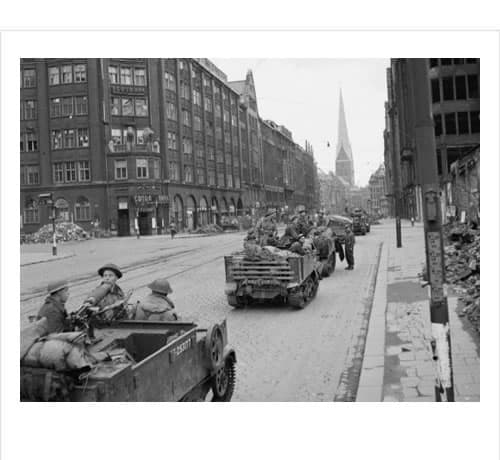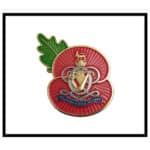The Capture of Hamburg was one of the last battles of World War II, where the remaining troops of the German 1st Parachute Army fought the British VIII Corps for the control of Hamburg, between 18 April and 3 May 1945.
British troops were met with fierce resistance as Hamburg was the last remaining pocket of resistance in the north. Once the British had captured the city, they continued their advance north-east and sealed off the remnants of the 1st Parachute Army and Army Group Northwest in the Jutland peninsula.
On 28th April, 3rd RHA shelled a Rubber Works in Hamburg and on the 29th a deputation from the city came out to discuss surrender. The negotiations went on for some time, but on 1st May General Woltz’s staff car under a white flag approached the ‘D’ Company 9th DLI.
Two staff officers were then taken to Battalion HQ. Admiral Doenitz had ordered General Keitel to order General Woltz to surrender the city of Hamburg to the Desert Rats. That night news of Hitler’s death in Berlin was on the radio and on 2nd May General Woltz (the commander of Hamburg) arrived at Divisional HQ to discuss the arrangements for the surrender, which was taken by Brigadier Spurling on the afternoon of 3rd May 1945.
That same afternoon, the 8th and 11th Hussars led the 7th Armoured Division into the ruined city.
‘C’ Squadron 11th Hussars, with 8th Hussars and 3rd RHA were then sent to nearby Pinneburg, to secure it too. On the night of 4th May, the news came of the surrender of German forces in Germany, Holland, Denmark and Norway and that hostilities were to cease at 08:00 the next morning.
After the surrender of Hamburg, some units from the Division moved on to Kiel, which many were glad to do because of the stench of the dead in the rubble. There they found large numbers of German troops who had escaped from the Russians on the Eastern Front.
Hamburg was the last remaining defence for the Germans in the north. After the British had captured the city, the surviving troops of the 1st Parachute Army along with Army Group Northwest retreated into the Jutland Peninsula. Most of them retreated to Kiel, where they met soldiers of Army Group Vistula, who were fleeing from the Soviets on the Eastern Front.
The 7th Armoured Division advanced unopposed to Lübeck, where news of the German surrender came on 4 May. When VE day was to be declared on 8th May 1945 the Division found itself at Kiel and in Hamburg on 8th May 1945. However, the Divisions’ long march was still not quite over.
The following is an account from Trooper Clive Teddy Teddern (a German Jew) who served in 2nd Troop ‘A’ Squadron 8th Hussars:
“When we advanced into northern Germany – the Luneberg area – I knew that very well because we had friends there and used to spend holidays there. Like a fool, I shot off my mouth and said, “I know the area like the back of my hand”. So when there was anything interesting going on, I volunteered, and one of the instances was when some Belgian officers came up to us. They were from a German prisoner of war camp. They gave us a location and it was decided that we would send a troop of tanks out to liberate them and a number of half-tracks to bring them back.
Of course, obviously, since I knew the area, I was on the Troop Leader’s tank… we took a number of prisoners but by that time they had been abandoned. My Troop Leader insisted I dismount with him to go to all the various houses to see what we could find, which wasn’t my idea, but I mean we had to go”.
Teddy was in Hamburg when Germany surrendered.
“Hamburg was declared an open city and we were the first British troops in there. My Troop Commander again wanted me to take him to the best known photographic shop in Hamburg, for reasons of his own. We found, liberated, a small German car. We drove about in that, and I also drove to the house where I spent my childhood, which, of course, was no more”.
It was completely destroyed in the firestorm. I have still got a tile which I broke off of what used to be our kitchen, and then we drove along to a place outside Hamburg, but when I was told the transports were coming back. I went to Hamburg several times.
My unit was very, very helpful and very supportive and generous and understanding… and when the transports came back I was there, it was then that I heard. Well, out of 3,000 people, 600 came back and some of them knew my parents and told me that they were sent to Auschwitz and, of course, very few came back from there.
I insisted on carrying out normal duties, and I was expected to, and I think that was the best thing to do. I had enormous sympathy and support from everybody but I was not given any exceptional treatment. I wouldn’t have wanted that. I mean, everybody knew what had happened to my parents and I had to accept that.
There were times when it really hit me. For instance on the occasion of my birthday, for instance… (and once) on a farm, with a newborn calf, somehow it was my friend because the calf was separated from its mother and so I could identify with it, somehow. But I just carried on with soldiering.



